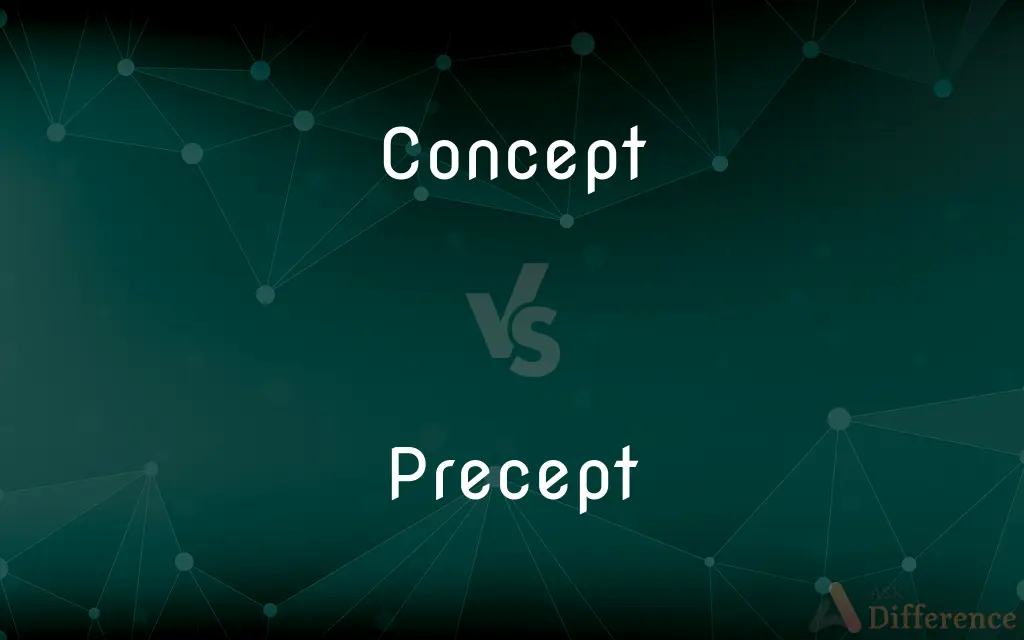Concept vs. Precept — What's the Difference?
By Tayyaba Rehman — Updated on November 4, 2023
A concept is an abstract idea or general notion, while a precept is a rule or principle dictating action or conduct.

Difference Between Concept and Precept
Table of Contents
ADVERTISEMENT
Key Differences
A concept is an abstract idea that represents the fundamental building blocks of thoughts and beliefs. It is a general understanding of something that is not tied to a specific instance. Conversely, a precept is an authoritative rule that guides behavior or thought, often derived from ethical or moral beliefs.
Concepts are used to categorize and interpret the world around us. They are often broad and can be applied to many different situations. For example, the concept of freedom is applied to various contexts, political or personal. Precepts, on the other hand, are specific and provide a directive or instruction, such as "Do unto others as you would have them do unto you."
In the realm of philosophy, concepts are essential for forming hypotheses and theories. They are not necessarily proven but are understood and accepted as part of a larger framework. Precepts are more pragmatic, often used to form the basis of rules or laws within societies. They are action-oriented and aim to influence conduct.
When developing a new theory, scientists will often talk about the underlying concepts that inform their research. These concepts guide their inquiry and experiments. Precepts, however, are more likely to be discussed in a legal or educational context, where they establish boundaries and expected behaviors, such as in the precepts of classroom conduct.
The creation of a concept is often a creative process, involving synthesis and imagination. In business, for example, a new concept for a product can revolutionize an industry. A precept, by contrast, is usually based on established principles and is created through deliberation and moral reasoning, aiming to uphold social order or ethical conduct.
ADVERTISEMENT
Comparison Chart
Definition
Abstract idea or notion
Rule or principle guiding action
Nature
Broad and theoretical
Specific and practical
Usage Context
Philosophy, science, theory
Law, ethics, guidelines
Function
To categorize and interpret
To instruct and guide behavior
Origin
Creative thinking, synthesis
Moral reasoning, authority
Compare with Definitions
Concept
Theoretical Understanding
She introduced a new concept to explain the phenomenon.
Precept
Legal Principle
The legal precept of ‘innocent until proven guilty’ is fundamental.
Concept
Innovation or Proposal
They developed a concept for a solar-powered car.
Precept
Rule of Conduct
The school's precepts include respect and honesty.
Concept
General Notion
The concept of time travel has always fascinated scientists.
Precept
Ethical Directive
He lived by the precept that one should always tell the truth.
Concept
Abstract Idea
The concept of justice varies across cultures.
Precept
Moral Instruction
The precepts of her religion played a significant role in her life.
Concept
Concepts are defined as abstract ideas or general notions that occur in the mind, in speech, or in thought. They are understood to be the fundamental building blocks of thoughts and beliefs.
Precept
A precept (from the Latin: præcipere, to teach) is a commandment, instruction, or order intended as an authoritative rule of action.
Concept
An abstract idea
Structuralism is a difficult concept
The concept of justice
Precept
A general rule intended to regulate behaviour or thought
The legal precept of being innocent until proven guilty
Children learn far more by example than by precept
Concept
A general idea or understanding of something
The concept of inertia.
The concept of free will.
Precept
A writ or warrant
The Commissioner issued precepts requiring the companies to provide information
Concept
A plan or original idea
The original concept was for a building with 12 floors.
Precept
An order issued by one local authority to another specifying the rate of tax to be charged on its behalf
The precept required a supplementary rate of 6.1p in the pound
Concept
A unifying idea or theme, especially for a product or service
A new restaurant concept.
Precept
A rule or principle prescribing a particular course of action or conduct.
Concept
Having an experimental or strikingly different design, especially to test or demonstrate new features
A concept car.
Precept
(Law) A direction or order issued by an authority; a writ, command, or process.
Concept
An abstract and general idea; an abstraction.
Precept
A rule or principle, especially one governing personal conduct.
Precept guides, but example draws.
Concept
Understanding retained in the mind, from experience, reasoning and imagination; a generalization (generic, basic form), or abstraction (mental impression), of a particular set of instances or occurrences (specific, though different, recorded manifestations of the concept).
Precept
(legal) A written command, especially a demand for payment.
Concept
(generic programming) A description of supported operations on a type, including their syntax and semantics.
Precept
(UK) An order issued by one local authority to another specifying the rate of tax to be charged on its behalf.
Concept
To conceive; to dream up
Precept
A rate or tax set by a precept.
Concept
An abstract general conception; a notion; a universal.
The words conception, concept, notion, should be limited to the thought of what can not be represented in the imagination; as, the thought suggested by a general term.
Precept
To act as a preceptor; to teach a physician-in-training by supervising their clinical practice.
Concept
An abstract or general idea inferred or derived from specific instances
Precept
To teach (something) by precepts.
Concept
Cognitive Construct
The child grasped the concept of multiplication quickly.
Precept
Any commandment, instruction, or order intended as an authoritative rule of action; esp., a command respecting moral conduct; an injunction; a rule.
For precept must be upon precept.
No arts are without their precepts.
Precept
A command in writing; a species of writ or process.
Precept
To teach by precepts.
Precept
Rule of personal conduct
Precept
A doctrine that is taught;
The teachings of religion
He believed all the Christian precepts
Precept
Guiding Maxim
As a teacher, her precept was Patience is the companion of wisdom.
Common Curiosities
How is a precept used?
A precept is a rule or guideline that dictates behavior or actions.
Are precepts legally binding?
Some precepts can be legally binding if incorporated into laws or regulations.
How do concepts affect learning?
Concepts are essential for organizing knowledge and facilitating learning.
Can precepts change over time?
Yes, precepts can change as societal values and norms evolve.
Can a precept be personal?
Yes, individuals can have personal precepts guiding their behavior.
What defines a concept?
A concept is an abstract idea that helps in understanding and categorizing things.
Is a concept always unique?
Not necessarily; concepts can be shared and common across different domains.
Can concepts be visual?
Yes, concepts can be visualized, though they are abstract by nature.
Do concepts have exceptions?
Concepts are general and can have exceptions based on context.
Do concepts evolve?
Yes, concepts can evolve as new information and understanding emerge.
Are precepts based on culture?
Precepts can be culturally influenced and vary between societies.
Are all precepts moral or ethical?
Most precepts have moral or ethical implications, but not all are explicitly so.
Is a concept tangible?
No, concepts are intangible and not experienced directly through the senses.
Can precepts conflict with each other?
Yes, conflicting precepts can arise from different ethical or moral frameworks.
How are new concepts created?
New concepts are often created through synthesis, creativity, and research.
Share Your Discovery

Previous Comparison
Mistress vs. Madam
Next Comparison
Penne vs. MostaccioliAuthor Spotlight
Written by
Tayyaba RehmanTayyaba Rehman is a distinguished writer, currently serving as a primary contributor to askdifference.com. As a researcher in semantics and etymology, Tayyaba's passion for the complexity of languages and their distinctions has found a perfect home on the platform. Tayyaba delves into the intricacies of language, distinguishing between commonly confused words and phrases, thereby providing clarity for readers worldwide.














































